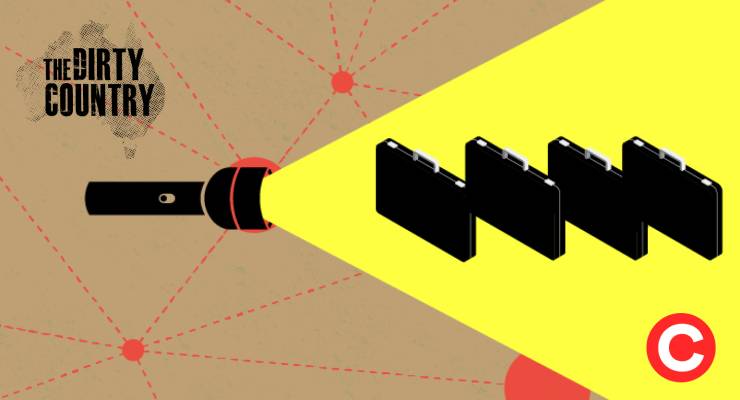
This is the eighth and final day of The Dirty Country: Corruption in Australia. Read the full series here.
In this series on “soft” corruption Bernard Keane and I have emphasised that there need not be an explicit quid pro quo between politicians and external parties for corruption to exist.
But as the events of the last month have shown, it is the implicit contract between politicians themselves that is responsible for what might be the most serious ethical and moral failing of all — the covering up of unacceptable, disrespectful, misogynistic, invariably revolting, and sometimes criminal behaviour by politicians and their staff.
All the talk of the need for cultural change in the parliament is, in a sense, exactly right. But in another sense the phrase “cultural change” is a content-free pair of weasel words that allow politicians to sidestep a hard yet pressing issue. The phrase certainly doesn’t provide any guidance about what might tangibly be done.
Prime Minister Scott Morrison likes to refer to himself as a “pragmatic person”. Yet with his comments on these issues — from the time that the story of former staffer Brittany Higgins came to light — the PM has not only shown a complete lack of understanding, but offered no practical solutions. At Tuesday’s press conference an attempted mea culpa turned into something resembling the docking of the Hindenburg.
If the first step in solving any problem is recognising there is one, then the second step is understanding the root cause of it.
And the root cause of the toxic culture in Australian politicians in general, and federal parliament in particular, can be summed up in one word: “omerta”.
The term originates in the code of silence practiced by the Mafia, but in recent decades it has become a broader phenomenon. Take professional cycling in the 1990s and early 2000s. We now know that doping using human growth hormones and steroids was rife, although not universal. But the code of silence — what the athletes themselves proudly called omerta — protected the bad actors.
The same code of silence persisted in the movie industry and parts of the U.S. media — as revelations regarding Harvey Weinstein, Roger Ailes, Bill O’Reilly and Charlie Rose made clear. A disgraceful culture of abuse and criminal behaviour was allowed to persist because of a code at the core of organisational culture.
Now it can be the case that a brave whistleblower can break the stranglehold of omerta. Floyd Landis did it in cycling, and Gretchen Carlson did it at Fox News.
But it’s hard, requires tremendous courage, and is almost inevitably a career-ending move.
The code of silence in Australian politics might be even harder to overcome. Journalists, fearing that if they reveal details about a politician will never be briefed by that side of politics again, are understandably hesitant to expose reprehensible — or even just bad — behaviour.
If even someone at the pinnacle of Australian journalism like Leigh Sales is grappling with what to do, then how can we expect less-senior journalists to risk their careers with no guarantee of making a difference.
So, while we can hope and wait for brave whistleblowers and journalists to make single-handed inroads into parliament’s omerta, we shouldn’t count on that alone to lead to cultural change.
Parliament needs an independent body that can assess claims of misconduct or abuse. Indeed, this is precisely the kind of approach that any number of people have suggested over the past month and earlier. It not only makes logical sense, it makes moral sense.
But on top of that, politicians and observers must recognise that being part of a code of silence is the same as being complicit. A politician that knows of the kind of allegations that have come to light in recent times and doesn’t speak out should be judged harshly. Those in the know who are not part of the solution must be seen as part of the cover-up, and hence part of the problem.
And while we should be worried about and try to reform things like the undue influence of money in politics, we urgently need to reform politics itself. A culture that allows what we have seen over the last month cannot be allowed to endure.
Many practical things are needed to change that culture. But right near the top of that list must be an end to omerta in the so-called Canberra bubble.
Richard Holden is professor of economics at UNSW Business School, and president-elect of the Academy of the Social Sciences in Australia.
Read the The Dirty Country: Corruption in Australia here.








Many like to assume that institutional arrangements and checks and balances are enough to suppress corruption. But in reality, all aspects of society actually rely on the participants being ethical. However, the ghastly Trump, Boris the Boofhead and now #ScottyFromMarketing have demonstrated is that no system of conventional ethics can constrain or hold to account those who are brazenly unethical.
There is no benefit to acting ethically and that can also be personally devastating as every whistleblower experiences. But there’re huge incentives to act unethically and bury the evidence. That is the core problem with current ‘democratic’ politics.
Yes, we certainly need stronger institutions, rules and laws given the readiness with which powerful people ignore ethics with impunity. But mere ‘accountability’, whatever that means is clearly not enough. Incentives must be created for ethical and courageous conduct and severe consequences created for the opposite. Not mere public embarrassment, but incarceration. The powerful have become embarrassment-proof.
The obvious problem is that those who benefit the most from acting unethically are the only ones who can change the system. What hope then?
This is a great opportunity for Labor, but only if it has the courage to accept that it too will be injured in any better system of transparency, and consequences it proposes in its next federal platform. If Labor does not have the courage to propose an authentic federal corruption commission, we really have no hope on the horizon.
However, a federal corruption commission is not enough. We must have legislated principles for all policy making: That policy must be demonstrably equitable, that policy must improve the environment, that policy must improve general equity, that policy must improve indigenous conditions, opportunity and happiness. With such principles in place, none of which any reasonable person could criticise, a corruption commission would have. a powerful basis from which to measure political conduct.
Interesting, while the white Christian nationalist or conservative modus operandi seem dependents upon, while trying to deflect from, sub-optimal morals and ethics, including the right to lie…..
Not sure what it says about Anglosphere citizens, voters, media, MPs, institutions etc., caught up in delusion of exceptionalism, but in fact compare with the less developed world?
Leigh Sales must be near the apex – she hosts Gladys Berejiklian’s annual Liberal Party fundraisers where the faithful had over big bucks to be sure they are heard.
Of course, she must be trusted not to upset the applecart.
I just wanted to say thank you and well done to the ever amazing Bernard Keane and the rest of the team. This is what Australia needed: a systematic explanation of the problem, followed by brainstorming and workable suggestions to solve it.
Also well done to the editorial team at Crikey for making the series freely available via MSN news. Everyone should read it, after all.
This series was a direct prompt for me to renew my Crikey membership – you guys need to be supported and cheered!
In his very early days, ScoMo gave a speech arguing that the public service needed to be ‘flexible and responsive’, or words to that effect. The public service had been hollowed out during Howard’s years, and ScoMo’s words echoed their general contempt, largely saying ‘we don’t pay you to think, just do, we’re the thinkers here’.
It revealed the LNPs misunderstanding of the Westminster system where the public service is a vehicle for advice and policy options. These know-all politicians claim that they have all the knowledge and the answers and don’t want advice, just action, it revealed just how arrogant and entitled their position and mindset is.
A strong and well resourced public service is a pillar of real democracy, but the LNP don’t want that, they want the US style of partisan government and public sector, and are open to being bought and sold. It is entirely an imported and pre-fabricated policy position brought to you by the Koch brothers of America, their fake think-tanks and ‘research centres’ and lobby groups. The IPA is just the local branch of what is a foreign nations usurping of our national sovereignty.
Leigh Sales & ALL other ABC Journalists (self called) are a Gutless lot for many reasons. They parrrot whatever info they get from the USA War mongering Govt as fact – when it’s actually false propaganda against Russia,China or Iran. No questions asked.
What really hurts is that they never once have taken up the honourable FIGHT to get this Countries mongrel Politicians to bring home Julian Assange. This Australian real Journalist is in mortal danger & has been abandoned by the Jusas politicians purely to suck up to the Yanks! – – And those same ABC Journalists ( self called) screamed in alarm when their Offices were raided by ASIO – Press Freedom !!
Despicable & NOT real Journalists these MSM parasites have been blasting our ears 24/7 for a Year about Virus related information that has NO Factual checking. The General public come to accept lies if they’re told & repeated often enough. Ask Gobels Ghost — they knew and the people beleived.
Delighted to find we can agree on some things.
The abandonment of Assange is an insight into what many in Australia really think about a free press. Assange should be bought home. He exposed war crimes. He is NOT the criminal.